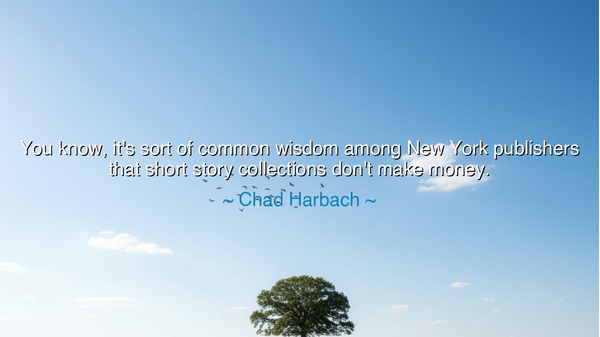
You know, it's sort of common wisdom among New York publishers
You know, it's sort of common wisdom among New York publishers that short story collections don't make money.






The words of Chad Harbach—“You know, it's sort of common wisdom among New York publishers that short story collections don't make money.”—speak not only to the practical world of commerce, but also to the eternal tension between art and profit. Within them lies the lament that the beauty of the short story, compact and powerful, is often undervalued in a market that hungers for the grander weight of the novel. The phrase “common wisdom” reveals not truth, but the hardened beliefs of an industry that measures worth in coin rather than spirit.
This utterance reminds us that the fate of literature often lies not in the hands of its dreamers, but in the ledgers of those who sell it. The short story collection, though capable of distilling entire lifetimes into a handful of pages, struggles to find its place in a world that prizes profit over subtlety. Yet this does not diminish the art itself. Rather, it highlights the courage of those who persist in writing short stories, knowing their creations may not yield wealth, but will endure as treasures of the imagination.
History offers us the radiant example of Anton Chekhov, master of the short story. Though he never sought riches, his works captured the small, intricate details of human life with such clarity that they continue to speak across centuries. Publishers may have seen little gold in such collections, but Chekhov’s legacy shines brighter than many novels that once lined the shelves of wealth-driven markets. His life is proof that the short story is not barren ground, but a field where eternal truths grow.
The quote also reflects the danger of common wisdom itself. What is widely believed is not always what is right. When profit blinds judgment, art risks being silenced. Yet again and again, writers rise to defy this wisdom, creating works that, though unprofitable in their own time, sow seeds of greatness for the future. In this struggle, the short story becomes a symbol of integrity, of creating for the sake of truth rather than coin.
Let this wisdom endure: do not let the worth of art be measured solely in money. The short story, though often dismissed, carries within it the same magic, the same wisdom, the same eternity as the longest novel. As Chad Harbach reminds us, the world of publishers may cling to its common wisdom, but the true value of literature is not in sales, but in the way it enlarges the heart and awakens the soul.






KDKhanh Doan
There’s a kind of irony here—short stories often showcase some of the most precise and powerful writing, yet they’re treated as commercially weak. Do you think part of the problem is reader perception? Maybe people associate short stories with academic study instead of entertainment. How could writers or publishers make the format feel more accessible and exciting for general audiences again?
THHoang Thi Ha
It’s interesting how financial logic can discourage artistic diversity. I’d love to know whether this mindset exists only in big publishing houses or if it extends to independent presses too. Are smaller publishers more open to short story collections because they prioritize craft over sales? Maybe the future of the short story lies in the indie world rather than mainstream publishing.
MPle minh phuong
This statement makes me think about how trends in publishing shape literary culture. If publishers believe short stories don’t sell, fewer get published, which means fewer readers encounter them—a self-fulfilling prophecy. I wonder what it would take to break that cycle. Could strong critical attention or innovative marketing actually revive interest in the form, or has it been too marginalized already?
TPTien Phat
I can’t help but question whether this so-called ‘common wisdom’ might be outdated. With digital platforms, audiobooks, and online magazines, short stories seem perfectly suited for modern consumption. Do you think publishers underestimate the potential of new markets and younger readers who crave bite-sized, emotionally intense stories? Maybe the traditional publishing model just hasn’t evolved fast enough to recognize that shift.
KHDoan Khanh Ha
This comment feels frustrating because it reduces literature to economics. Why should profitability determine what gets published or valued? Some of the greatest writers—like Alice Munro or Raymond Carver—built their reputations on short stories. Maybe the real issue isn’t money, but the industry’s unwillingness to take creative risks anymore. Should art always have to justify itself in financial terms?